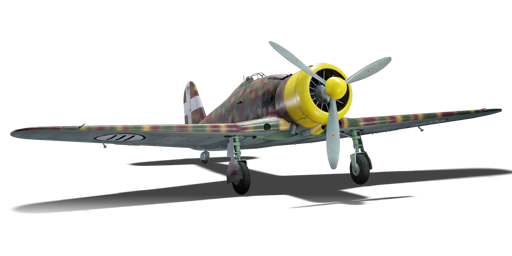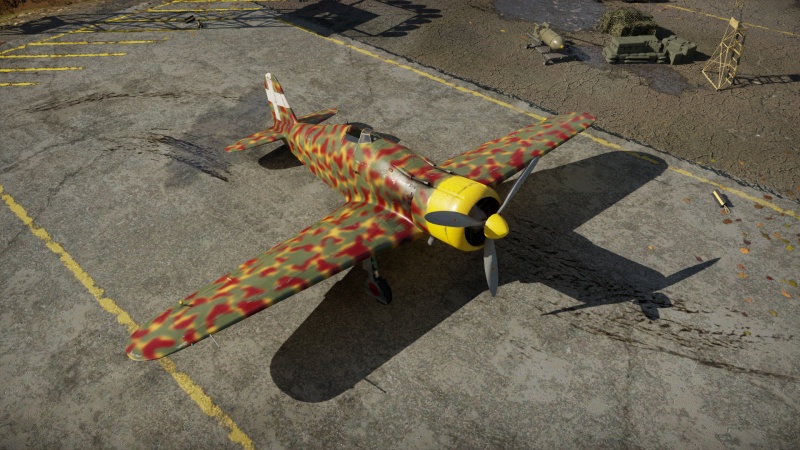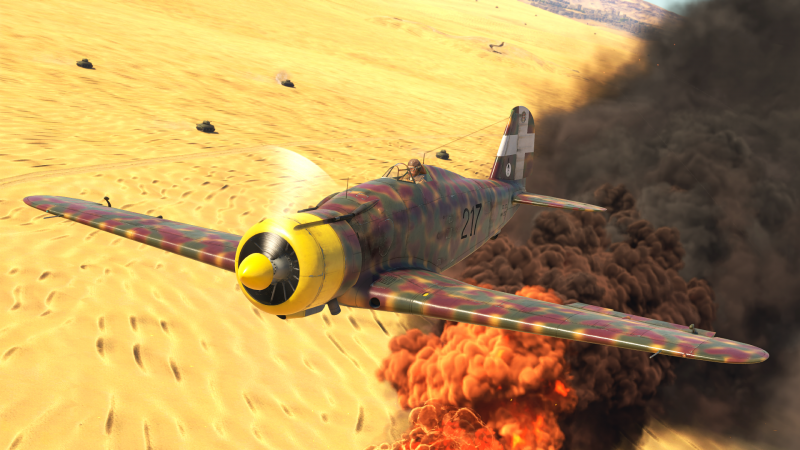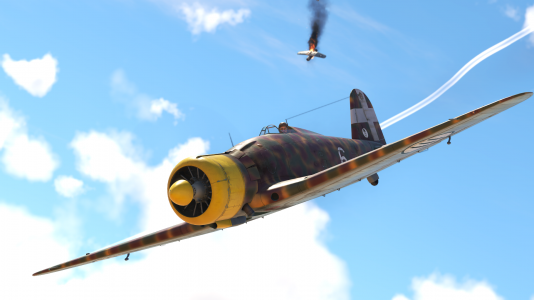Difference between revisions of "G.50 serie 2"
(New Specs-Card Artimage. Old picture moved to Media: Images) |
|||
| (6 intermediate revisions by 4 users not shown) | |||
| Line 1: | Line 1: | ||
| − | |||
| − | |||
| − | |||
| − | |||
{{About | {{About | ||
| about = Italian fighter '''{{PAGENAME}}''' | | about = Italian fighter '''{{PAGENAME}}''' | ||
| Line 10: | Line 6: | ||
| usage-2 = other versions | | usage-2 = other versions | ||
| link-2 = G.50 (Family) | | link-2 = G.50 (Family) | ||
| + | }} | ||
| + | {{Specs-Card | ||
| + | |code=fiat_g50_seria2_italy | ||
| + | |images={{Specs-Card-Image|GarageImage_{{PAGENAME}}.jpg|ArtImage2_{{PAGENAME}}.png}} | ||
}} | }} | ||
== Description == | == Description == | ||
<!-- ''In the description, the first part should be about the history of and the creation and combat usage of the aircraft, as well as its key features. In the second part, tell the reader about the aircraft in the game. Insert a screenshot of the vehicle, so that if the novice player does not remember the vehicle by name, he will immediately understand what kind of vehicle the article is talking about.'' --> | <!-- ''In the description, the first part should be about the history of and the creation and combat usage of the aircraft, as well as its key features. In the second part, tell the reader about the aircraft in the game. Insert a screenshot of the vehicle, so that if the novice player does not remember the vehicle by name, he will immediately understand what kind of vehicle the article is talking about.'' --> | ||
| − | + | The '''{{Specs|name}}''' is a rank {{Specs|rank}} Italian fighter {{Battle-rating}}. It was introduced in [[Update 1.69 "Regia Aeronautica"]], though a variant existed in the [[G.50 serie 2 (Germany)|German tech tree]] prior to the update. | |
| − | |||
| − | The '''{{Specs|name}}''' is a rank {{Specs|rank}} Italian fighter {{Battle-rating}}. It was introduced in [[Update 1.69 "Regia Aeronautica"]], though a variant existed in the [[G. | ||
== General info == | == General info == | ||
| Line 22: | Line 20: | ||
{{Specs-Avia-Flight}} | {{Specs-Avia-Flight}} | ||
<!-- ''Describe how the aircraft behaves in the air. Speed, manoeuvrability, acceleration and allowable loads - these are the most important characteristics of the vehicle.'' --> | <!-- ''Describe how the aircraft behaves in the air. Speed, manoeuvrability, acceleration and allowable loads - these are the most important characteristics of the vehicle.'' --> | ||
| − | In general, it's a slightly lesser version of the [[C. | + | In general, it's a slightly lesser version of the [[C. 200 serie 3]], and as such, it very much flies the same, albeit a little bit slower but having slightly better manoeuvrability (1-second differences in turn time). |
With its decent rate of climb, its generally best to ensure you have proper altitude to play around with first. Generally for low rank planes like the G.50 3,000 - 4,000 m is generally enough, from there the way of flying should be dictated by the situation and opponents. Its good acceleration in dives and respectable dive speed means it can be used as a pure Boom & Zoomer, especially when you realise its energy retention is better then that of many other planes at its battle rating. However, it is also a decent turn-fighter, barring the poor acceleration, so it can be used as such as well. Be warned on regular biplanes and Japanese monoplanes. Both of which are considerably better, bar high speeds, where the stiffness of controls on the G.50 are less than on either biplanes or Japanese planes. | With its decent rate of climb, its generally best to ensure you have proper altitude to play around with first. Generally for low rank planes like the G.50 3,000 - 4,000 m is generally enough, from there the way of flying should be dictated by the situation and opponents. Its good acceleration in dives and respectable dive speed means it can be used as a pure Boom & Zoomer, especially when you realise its energy retention is better then that of many other planes at its battle rating. However, it is also a decent turn-fighter, barring the poor acceleration, so it can be used as such as well. Be warned on regular biplanes and Japanese monoplanes. Both of which are considerably better, bar high speeds, where the stiffness of controls on the G.50 are less than on either biplanes or Japanese planes. | ||
| Line 66: | Line 64: | ||
! Combat !! Take-off !! Landing !! + !! - | ! Combat !! Take-off !! Landing !! + !! - | ||
|- | |- | ||
| − | | {{Specs|destruction|body}} || {{Specs|destruction|gear}} || | + | | {{Specs|destruction|body}} || {{Specs|destruction|gear}} || 535 || 450 || 260 || ~14 || ~6 |
|- | |- | ||
|} | |} | ||
| Line 77: | Line 75: | ||
|- | |- | ||
| < 360 || < 270 || < 500 || > 300 | | < 360 || < 270 || < 500 || > 300 | ||
| − | |||
| − | |||
| − | |||
| − | |||
| − | |||
| − | |||
| − | |||
| − | |||
| − | |||
| − | |||
| − | |||
| − | |||
| − | |||
| − | |||
|- | |- | ||
|} | |} | ||
| Line 117: | Line 101: | ||
== Usage in battles == | == Usage in battles == | ||
<!-- ''Describe the tactics of playing in the aircraft, the features of using aircraft in a team and advice on tactics. Refrain from creating a "guide" - do not impose a single point of view, but instead, give the reader food for thought. Examine the most dangerous enemies and give recommendations on fighting them. If necessary, note the specifics of the game in different modes (AB, RB, SB).'' --> | <!-- ''Describe the tactics of playing in the aircraft, the features of using aircraft in a team and advice on tactics. Refrain from creating a "guide" - do not impose a single point of view, but instead, give the reader food for thought. Examine the most dangerous enemies and give recommendations on fighting them. If necessary, note the specifics of the game in different modes (AB, RB, SB).'' --> | ||
| − | The Fiat G.50 Freccia is a typical Italian pre-war design, it's fairly sturdy, has modest speed and | + | The Fiat G.50 Freccia is a typical Italian pre-war design, it's fairly sturdy, has modest speed and armament for the BR consisting of 2 Breda-SAFAT 12.7 mm guns mounted in the upper cowling, which means it has the distinctive low rate of fire (roughly 400 rounds per minute). However it does have its merits as well, it's fairly agile, it has no trouble dog fighting Hurricanes it will commonly face, and if things become too hectic, the G.50 can quickly escape by going into a dive, and exploiting its surprisingly good dive acceleration to gain separation. Furthermore it pays to be aware of its modest acceleration and overheating, as such, it's generally advised to keep an eye on your speed and use WEP sparingly. |
| − | For the armament, the same applies to all other Italian aircraft; generally you want to use | + | For the armament, the same applies to all other Italian aircraft; generally you want to use Tracers, Air targets or Stealth since they are the belts that deal the most damage. Shell velocity is low, hence they suffer above 300 m, so only fire at or below that range for best effects. Furthermore, much like the other Italian fighters the armament is woefully inadequate to deal with bombers, hence it is best to avoid them entirely, or focus on taking out the engines. The only exceptions are the very early biplane bombers, such as [[Swordfish Mk I|Swordfish]], [[Po-2]] and the like. |
=== Manual Engine Control === | === Manual Engine Control === | ||
| Line 135: | Line 119: | ||
|- | |- | ||
| Controllable || Controllable<br>Not auto controlled || Controllable<br>Not auto controlled || Controllable<br>Not auto controlled || Separate || Not controllable<br>1 gear || Not controllable | | Controllable || Controllable<br>Not auto controlled || Controllable<br>Not auto controlled || Controllable<br>Not auto controlled || Separate || Not controllable<br>1 gear || Not controllable | ||
| − | |||
| − | |||
| − | |||
| − | |||
| − | |||
| − | |||
| − | |||
| − | |||
| − | |||
| − | |||
| − | |||
| − | |||
| − | |||
| − | |||
| − | |||
| − | |||
| − | |||
| − | |||
| − | |||
| − | |||
| − | |||
| − | |||
| − | |||
| − | |||
| − | |||
| − | |||
| − | |||
| − | |||
| − | |||
| − | |||
| − | |||
| − | |||
| − | |||
|- | |- | ||
|} | |} | ||
| Line 181: | Line 132: | ||
* High maximum dive speed | * High maximum dive speed | ||
* Decent high speed handling | * Decent high speed handling | ||
| − | * Good | + | * Good dogfighter |
'''Cons:''' | '''Cons:''' | ||
| Line 193: | Line 144: | ||
== History == | == History == | ||
<!-- ''Describe the history of the creation and combat usage of the aircraft in more detail than in the introduction. If the historical reference turns out to be too long, take it to a separate article, taking a link to the article about the vehicle and adding a block "/History" (example: <nowiki>https://wiki.warthunder.com/(Vehicle-name)/History</nowiki>) and add a link to it here using the <code>main</code> template. Be sure to reference text and sources by using <code><nowiki><ref></ref></nowiki></code>, as well as adding them at the end of the article with <code><nowiki><references /></nowiki></code>. This section may also include the vehicle's dev blog entry (if applicable) and the in-game encyclopedia description (under <code><nowiki>=== In-game description ===</nowiki></code>, also if applicable).'' --> | <!-- ''Describe the history of the creation and combat usage of the aircraft in more detail than in the introduction. If the historical reference turns out to be too long, take it to a separate article, taking a link to the article about the vehicle and adding a block "/History" (example: <nowiki>https://wiki.warthunder.com/(Vehicle-name)/History</nowiki>) and add a link to it here using the <code>main</code> template. Be sure to reference text and sources by using <code><nowiki><ref></ref></nowiki></code>, as well as adding them at the end of the article with <code><nowiki><references /></nowiki></code>. This section may also include the vehicle's dev blog entry (if applicable) and the in-game encyclopedia description (under <code><nowiki>=== In-game description ===</nowiki></code>, also if applicable).'' --> | ||
| − | The G.50 was the first all-metal Italian monoplane fighter, and the first with retractable landing gear. A contemporary of the CR.42 biplane, it was a transitional plane that was not well-liked by pilots used to more | + | The G.50 was the first all-metal Italian monoplane fighter, and the first with retractable landing gear. A contemporary of the CR.42 biplane, it was a transitional plane that was not well-liked by pilots used to more manoeuvrable biplanes. Sturdy and easy to handle, it was slow and poorly armed even by early war standards. Designed by Fiat's Giuseppi Gabrielli, it lost the 1936 competition for a new interceptor to the Macchi M.C. 200, but was chosen anyway. Combat flight tests in Spain in 1939 followed, and the first planes entered combat service in late 1939. Finland bought 35 G.50s, using them in their air force until 1944. |
At the start of World War Two there were 118 G.50s in Italian service in two fighter ''Gruppi''. They fought in the invasion of France, and then in the Battle of Britain alongside C.R. 42s, performing poorly against British fighters. It continued in service in Greece, the Mediterranean and Africa, but by 1940 was largely used as a ground attacker. A total of 782 were built. | At the start of World War Two there were 118 G.50s in Italian service in two fighter ''Gruppi''. They fought in the invasion of France, and then in the Battle of Britain alongside C.R. 42s, performing poorly against British fighters. It continued in service in Greece, the Mediterranean and Africa, but by 1940 was largely used as a ground attacker. A total of 782 were built. | ||
| Line 199: | Line 150: | ||
== Media == | == Media == | ||
<!-- ''Excellent additions to the article would be video guides, screenshots from the game, and photos.'' --> | <!-- ''Excellent additions to the article would be video guides, screenshots from the game, and photos.'' --> | ||
| + | |||
| + | ;Images | ||
| + | <gallery mode="packed-hover" heights="200"> | ||
| + | File:ArtImage G.50 serie 2.png|<small>G.50 Serie 2 in El-Alemain</small> | ||
| + | </gallery> | ||
| + | |||
| + | ;Skins | ||
| + | |||
| + | * [https://live.warthunder.com/feed/camouflages/?vehicle=fiat_g50_seria2_italy Skins and camouflages for the {{PAGENAME}} from live.warthunder.com.] | ||
| + | |||
| + | ;Videos | ||
{{Youtube-gallery|V2grV9sYBfE|'''The Shooting Range #7''' - ''Pages of History'' section at 06:09 discusses the G.50.}} | {{Youtube-gallery|V2grV9sYBfE|'''The Shooting Range #7''' - ''Pages of History'' section at 06:09 discusses the G.50.}} | ||
== See also == | == See also == | ||
''Links to the articles on the War Thunder Wiki that you think will be useful for the reader, for example:'' | ''Links to the articles on the War Thunder Wiki that you think will be useful for the reader, for example:'' | ||
| + | |||
* ''reference to the series of the aircraft;'' | * ''reference to the series of the aircraft;'' | ||
* ''links to approximate analogues of other nations and research trees.'' | * ''links to approximate analogues of other nations and research trees.'' | ||
| Line 208: | Line 171: | ||
== External links == | == External links == | ||
''Paste links to sources and external resources, such as:'' | ''Paste links to sources and external resources, such as:'' | ||
| + | |||
* ''topic on the official game forum;'' | * ''topic on the official game forum;'' | ||
| − | |||
* ''other literature.'' | * ''other literature.'' | ||
{{AirManufacturer Fiat}} | {{AirManufacturer Fiat}} | ||
{{Italy fighters}} | {{Italy fighters}} | ||
Latest revision as of 17:36, 3 March 2024
| This page is about the Italian fighter G.50 serie 2. For the German version, see G.50 serie 2 (Germany). For other versions, see G.50 (Family). |
Contents
Description
The G.50 Freccia serie 2 is a rank Italian fighter with a battle rating of (AB), (RB), and (SB). It was introduced in Update 1.69 "Regia Aeronautica", though a variant existed in the German tech tree prior to the update.
General info
Flight performance
In general, it's a slightly lesser version of the C. 200 serie 3, and as such, it very much flies the same, albeit a little bit slower but having slightly better manoeuvrability (1-second differences in turn time).
With its decent rate of climb, its generally best to ensure you have proper altitude to play around with first. Generally for low rank planes like the G.50 3,000 - 4,000 m is generally enough, from there the way of flying should be dictated by the situation and opponents. Its good acceleration in dives and respectable dive speed means it can be used as a pure Boom & Zoomer, especially when you realise its energy retention is better then that of many other planes at its battle rating. However, it is also a decent turn-fighter, barring the poor acceleration, so it can be used as such as well. Be warned on regular biplanes and Japanese monoplanes. Both of which are considerably better, bar high speeds, where the stiffness of controls on the G.50 are less than on either biplanes or Japanese planes.
| Characteristics | Max Speed (km/h at 5,000 m) |
Max altitude (metres) |
Turn time (seconds) |
Rate of climb (metres/second) |
Take-off run (metres) | |||
|---|---|---|---|---|---|---|---|---|
| AB | RB | AB | RB | AB | RB | |||
| Stock | 451 | 435 | 15.8 | 16.5 | 11.9 | 11.9 | 283 | |
| Upgraded | 492 | 470 | 14.4 | 15.0 | 19.0 | 15.0 | ||
Details
| Features | ||||
|---|---|---|---|---|
| Combat flaps | Take-off flaps | Landing flaps | Air brakes | Arrestor gear |
| ✓ | ✓ | ✓ | X | X |
| Limits | ||||||
|---|---|---|---|---|---|---|
| Wings (km/h) | Gear (km/h) | Flaps (km/h) | Max Static G | |||
| Combat | Take-off | Landing | + | - | ||
| 535 | 450 | 260 | ~14 | ~6 | ||
| Optimal velocities (km/h) | |||
|---|---|---|---|
| Ailerons | Rudder | Elevators | Radiator |
| < 360 | < 270 | < 500 | > 300 |
Survivability and armour
- No armour
- Self-sealing fuel tanks (2 under the gun barrels, 1 behind ammo and 1 in each wingroot)
Modifications and economy
Armaments
Offensive armament
The G.50 serie 2 is armed with:
- 2 x 12.7 mm Breda-SAFAT machine guns, nose-mounted (300 rpg = 600 total)
Usage in battles
The Fiat G.50 Freccia is a typical Italian pre-war design, it's fairly sturdy, has modest speed and armament for the BR consisting of 2 Breda-SAFAT 12.7 mm guns mounted in the upper cowling, which means it has the distinctive low rate of fire (roughly 400 rounds per minute). However it does have its merits as well, it's fairly agile, it has no trouble dog fighting Hurricanes it will commonly face, and if things become too hectic, the G.50 can quickly escape by going into a dive, and exploiting its surprisingly good dive acceleration to gain separation. Furthermore it pays to be aware of its modest acceleration and overheating, as such, it's generally advised to keep an eye on your speed and use WEP sparingly.
For the armament, the same applies to all other Italian aircraft; generally you want to use Tracers, Air targets or Stealth since they are the belts that deal the most damage. Shell velocity is low, hence they suffer above 300 m, so only fire at or below that range for best effects. Furthermore, much like the other Italian fighters the armament is woefully inadequate to deal with bombers, hence it is best to avoid them entirely, or focus on taking out the engines. The only exceptions are the very early biplane bombers, such as Swordfish, Po-2 and the like.
Manual Engine Control
| MEC elements | ||||||
|---|---|---|---|---|---|---|
| Mixer | Pitch | Radiator | Supercharger | Turbocharger | ||
| Oil | Water | Type | ||||
| Controllable | Controllable Not auto controlled |
Controllable Not auto controlled |
Controllable Not auto controlled |
Separate | Not controllable 1 gear |
Not controllable |
Pros and cons
Pros:
- Good visibility from the cockpit
- Decent rate of climb
- Good acceleration in a dive
- High maximum dive speed
- Decent high speed handling
- Good dogfighter
Cons:
- Modest armament
- Poor acceleration in level flight
- Overheating is a issue
- Guns deal very little damage at long range
- Modest speed
History
The G.50 was the first all-metal Italian monoplane fighter, and the first with retractable landing gear. A contemporary of the CR.42 biplane, it was a transitional plane that was not well-liked by pilots used to more manoeuvrable biplanes. Sturdy and easy to handle, it was slow and poorly armed even by early war standards. Designed by Fiat's Giuseppi Gabrielli, it lost the 1936 competition for a new interceptor to the Macchi M.C. 200, but was chosen anyway. Combat flight tests in Spain in 1939 followed, and the first planes entered combat service in late 1939. Finland bought 35 G.50s, using them in their air force until 1944.
At the start of World War Two there were 118 G.50s in Italian service in two fighter Gruppi. They fought in the invasion of France, and then in the Battle of Britain alongside C.R. 42s, performing poorly against British fighters. It continued in service in Greece, the Mediterranean and Africa, but by 1940 was largely used as a ground attacker. A total of 782 were built.
Media
- Images
- Skins
- Videos
See also
Links to the articles on the War Thunder Wiki that you think will be useful for the reader, for example:
- reference to the series of the aircraft;
- links to approximate analogues of other nations and research trees.
External links
Paste links to sources and external resources, such as:
- topic on the official game forum;
- other literature.
| Fiat Aviation (Fiat Aviazione) | |
|---|---|
| Fighters | CR.32 · CR.32 bis · CR.32 quater |
| CR.42 · Marcolin's C.R.42 CN · ▀Marcolin's C.R.42 CN | |
| G.50 serie 2 · G.50 AS serie 7 | |
| G.55 sottoserie 0 · G.55 serie 1 · G.55S | |
| G.56 | |
| Jet fighters | G.91 pre-serie · G.91 R/1 · G.91 Y · G.91 YS |
| ▄F-86K* | |
| ▄F-104G* · F-104S* · F-104S.ASA* · ▄F-104S TAF* | |
| Strike aircraft | F.C.20 Bis |
| Bombers | B.R.20DR · B.R.20M M1 |
| Export/Captured | J11 · ▀CR.42 |
| ▀G.50 serie 2 · ▀G.50 AS serie 7 | |
| ◄G.91 R/3 · ◄G.91 R/4 · G.91 R/4 | |
| *Licensed | |
| See also | North American Aviation · Lockheed Martin |
| Italy fighters | |
|---|---|
| Fiat | CR.32 · CR.32 bis · CR.32 quater · CR.42 · Marcolin's C.R.42 CN |
| G.50 serie 2 · G.50 AS serie 7 | |
| G.55 sottoserie 0 · G.55 serie 1 · G.55S · G.56 | |
| Reggiane | Re.2000 G.A. · Re.2000 serie 1 |
| Re.2001 serie 1 · Re.2001 gruppo 22 · Re.2001 CB · Re.2001 CN | |
| Re.2002 Early | |
| Re.2005 serie 0 | |
| Macchi | C. 200 serie 3 · C. 200 serie 7 |
| C. 202 · C. 202D · C. 202EC | |
| C. 205 serie 1 · C. 205 serie 3 · C. 205N2 | |
| IMAM | Ro.44 |
| Foreign: | |
| Germany | ▄Bf 109 G-14/AS |
| USA | ▄P-47D-30 |
| Britain | ▄Spitfire Mk Vb/trop |
| Hungary | ◐Bf 109 F-4 · ◐Bf 109 G-2 · ◔Yak-9P |
| Romania | He 112 B-1/U2 · IAR-81C |







